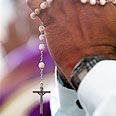
The two faiths must keep this awareness alive at a time when the last survivors of the Holocaust are dying and both the Catholic and Jewish worlds are changing in significant ways, they said at the end of a four-day interfaith conference.
The International Catholic-Jewish Liaison Committee (ILC) met in Paris to discuss the future of the dialogue begun after the Catholic Church renounced its anti-Semitism and declared its respect for Judaism at the Second Vatican Council in 1965.
"We have new generations for whom the problems between Judaism and Christianity, especially the Shoah, are history," said Cardinal Kurt Koch, the top Vatican official for relations with Jews. "We can't leave that to history."
Rabbi David Rosen of the American Jewish Committee said: "Today most young Catholics have no comprehension of how tragic the relationship in the past between Jews and Catholics was.
"Jews were viewed as the enemies of God, in league with the devil, responsible for the tragedies of the world," he said, but the Church now saw them as "dearly beloved elder brothers."
Relations have gone up and down in the 40 years since the ILC first met in 1971. Current tensions – over the planned beatification of wartime Pope Pius XII or Holocaust denial by a traditionalist bishop – came up briefly at the conference.
"The issue is how to interpret them," said Rabbi Richard Marker, the top world Jewish official for interfaith ties.
"While one might argue that, in the scheme of all our achievements, these issues are merely symbolic, the fact that they speak to sensitivities in the community makes them important," he said.
Need for education
In recent decades, Catholics and Jews around the world have held countless meetings, discussions and mutual visits to houses of worship to improve contacts between the world's largest religion, Christianity, and its smaller religious ancestor.
Illustrating their close ties, the Vatican on Wednesday issued pre-publication excerpts of a new book by Pope Benedict in which he gives a detailed explanation of why the Church no longer accused the Jews of causing the death of Jesus.
Marker, who chairs the International Jewish Committee for Interreligious Consultation (IJCIC), said demographic changes would affect how the two faiths related to each other in future.
"Catholicism is becoming a Southern Hemisphere religion," he said, referring to its growth in Africa, Latin America and Asia. "They're not familiar with Judaism, they're not familiar with each other and they're all different from European Catholicism."
Delegates to the ILC have traditionally been "northern and western," he noted, and that would probably have to change.
Many participants saw interfaith dialogue as part of their religious identity, he said, but there were now some Catholics and some Orthodox Jews "who feel that dealing with the other is not necessarily a productive enterprise."
The passing of the generations with direct knowledge of the Holocaust would also change the dialogue, he said, adding: "It takes two generations for something to go from memory to myth."
Dialogue with Islam
The closed-door talks took up the question of increasing contacts with Muslims without setting out any new initiatives.
"We spoke about a trialogue of Catholics, Jews and Muslims because we have a lot in common," Koch said. "But there are also problems. Some terms don't always mean the same thing for us."
Marker said that IJCIC already held discussions with some Muslim groups but there was no Islamic world body to speak to. The Vatican also has contacts with different groups in Islam.
IJCIC's experience in bringing together different strands of Judaism could be a useful model for Muslims trying to create a world body to speak for them with Christians and Jews, he said.
"I think there will be two tracks," Marker said. "There will be some space for trilateral dialogue and there will be a necessity to maintain bilateral dialogue."
- Follow Ynetnews on Facebook















